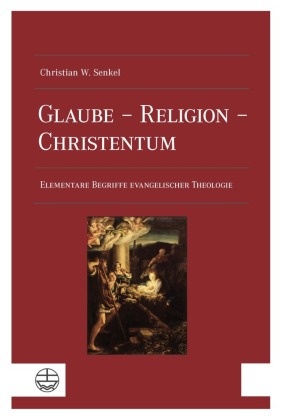Glaube - Religion - Christentum - Elementare Begriffe evangelischer Theologie
| Verlag | Evangelische Verlagsanstalt |
| Auflage | 2024 |
| Seiten | 330 |
| Format | 15,6 x 2,0 x 23,0 cm |
| Großformatiges Paperback. Klappenbroschur | |
| Gewicht | 509 g |
| ISBN-10 | 337407555X |
| ISBN-13 | 9783374075553 |
| Bestell-Nr | 37407555A |
Glaube, Religion und Christentum sind elementare Begriffe der Theologie. Sie erscheinen in (fast) jedem theologischen Entwurf als unvermeidliche Bezugsgrößen. Doch sie stehen auch für Denkweisen, die sich hauptsächlich auf einen der drei Begriffe stützen: als klassische Dogmatik des Glaubens, als liberale Theologie der Religion oder als moderne Theorie des Christentums. Schließlich kennzeichnen Glaube, Religion und Christentum auch Epochen, in denen der jeweilige Elementarbegriff umgebildet oder neugebildet wird.
Der sprachlich ausgezeichnete und theologisch sehr hilfreiche Band von Christian Senkel stellt zu jeder der drei Sinndimensionen brauchbares Wissen bereit, er geht aber über ein Kompendium hinaus. Eigene Pointen finden sich im Aufbau, in der Darstellung und an Wegmarken der Interpretation. Die drei elementaren Begriffe machen gemeinsame Sache, ohne ineinander aufzugehen. Es ergeben sich drei mal vier Überlegungen, einer Vorlesung gemäß unterteilt: Glaube von Luther bi s zum modernen Freiheitsverständnis - Religion vor und nach Schleiermachers romantischem Entwurf bis zur Lebensweltdeutung - die Theorie des konfessionell und kulturell höchst diversifizierten Christentums.
[Faith - Religion - Christianity. Basic Concepts of Protestant Theology]
Faith, religion and Christianity are basic concepts of theology. They appear in (almost) every theological draft as unavoidable references. But they also stand for ways of thinking, each based primarily on one of the three terms: as classical dogmatics of faith, as liberal theology of religion, or as modern theory of Christianity. Ultimately, faith, religion, and Christianity also mark epochs in which the respective basic concept is transformed or defined anew.
Christian Senkel's volume, which is excellent linguistically and very helpful theologically, provides useful knowledge on each of the three dimensions of meaning, and yet it goes beyond a compendium. It makes its own points in the st ructure, presentation, and at junctures of interpretation. The three basic concepts have a common cause without being absorbed into each other. The result is three reflections times four, divided according to a lecture: faith from Luther to the modern understanding of freedom - religion before and after Schleiermacher's romantic draft up to the interpretation of the lifeworld - the theory of denominationally and culturally highly diversified Christianity.

